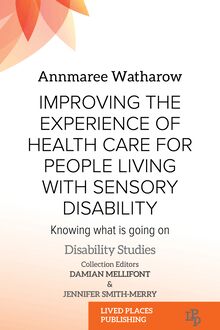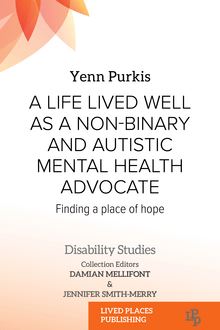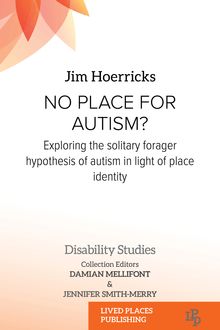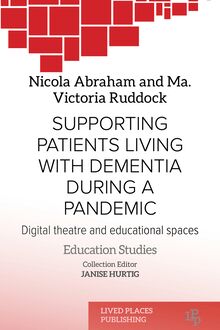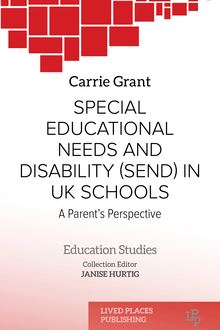-
 Univers
Univers
-
 Ebooks
Ebooks
-
 Livres audio
Livres audio
-
 Presse
Presse
-
 Podcasts
Podcasts
-
 BD
BD
-
 Documents
Documents
-
- Cours
- Révisions
- Ressources pédagogiques
- Sciences de l’éducation
- Manuels scolaires
- Langues
- Travaux de classe
- Annales de BEP
- Etudes supérieures
- Maternelle et primaire
- Fiches de lecture
- Orientation scolaire
- Méthodologie
- Corrigés de devoir
- Annales d’examens et concours
- Annales du bac
- Annales du brevet
- Rapports de stage
La lecture à portée de main
Vous pourrez modifier la taille du texte de cet ouvrage
Découvre YouScribe en t'inscrivant gratuitement
Je m'inscrisA Life Lived Well as a Non-binary and Autistic Mental Health Advocate , livre ebook
Découvre YouScribe en t'inscrivant gratuitement
Je m'inscrisEn savoir plus
Vous pourrez modifier la taille du texte de cet ouvrage
En savoir plus

Description
What might it look like for an Autistic, non-binary person who lives with mental illness to live well and with hope?
In this book, author and advocate Yenn Purkis reflects on their experiences of life as an Autistic non-binary person who has a diagnosis of atypical schizophrenia. Exploring the intersecting areas of mental health and illness, neurodivergence and neurodiversity, and gender non-conformity, the narrative follows Yenn through experiences of incarceration, psychosis, employment, therapy both helpful and not, medication, diagnosis, stigma and anxiety.
Illuminating reading for students of disability studies, Autism studies, queer studies, and related social sciences, this book will also bring important perspective to those in practice and in training: doctors, psychiatrists, policy makers, teachers, and social workers. Yenn will describe a life well-lived, with and alongside Autism and mental illness, that will provide a vital perspective to anyone studying or working people who share these social identities.
Introduction
Chapter 1: What is Autism?
Chapter 2: Mental health
Chapter 3: Anxiety
Chapter 4: Depression and other mood issues
Chapter 5: Psychosis
Chapter 6: Self- harm
Chapter 7: Suicide
Chapter 8: Medication
Chapter 9: Alexithymia and interoception
Chapter 10: Psychiatric hospital
Chapter 11: Diagnosis and misdiagnosis
Chapter 12: Attitudes and stigma about Autism and mental illness
Chapter 13: Intersectionality and privilege
Chapter 14: The impact of clinicians
Chapter 15: Advocacy and activism
Chapter 16: Engaging in education and employment
Chapter 17: Pride and empowerment
Chapter 18: Acceptance and denial
Recommended further reading and helpful resources
Sujets
Informations
| Publié par | Lived Places Publishing |
| Date de parution | 22 février 2023 |
| Nombre de lectures | 0 |
| EAN13 | 9781915271280 |
| Langue | English |
Informations légales : prix de location à la page 0,1250€. Cette information est donnée uniquement à titre indicatif conformément à la législation en vigueur.
Extrait
A life lived well as a non-binary and Autistic mental health advocate
Yenn Purkis
A life lived well as a non-binary and Autistic mental health advocate
The Disability Studies Collection
Collection editors
Dr Damian Mellifont & Dr Jennifer Smith-Merry
First published in 2023 by Lived Places Publishing
All rights reserved. No part of this publication may be reproduced, stored in a retrieval system, or transmitted in any form or by any means, electronic, mechanical, photocopying, recording or otherwise, without prior permission in writing from the publisher.
The authors and editors have made every effort to ensure the accuracy of information contained in this publication, but assume no responsibility for any errors, inaccuracies, inconsistencies and omissions. Likewise, every effort has been made to contact copyright holders. If any copyright material has been reproduced unwittingly and without permission the Publisher will gladly receive information enabling them to rectify any error or omission in subsequent editions.
Copyright © 2023 Lived Places Publishing
British Library Cataloguing in Publication Data
A CIP record for this book is available from the British Library
ISBN: 9781915271273 (pbk)
ISBN: 9781915271297 (ePDF)
ISBN: 9781915271280 (ePUB)
The right of Yenn Purkis to be identified as the Author of this work has been asserted by them in accordance with the Copyright, Design and Patents Act 1988.
Cover design by Fiachra McCarthy
Book design by Rachel Trolove of Twin Trail Design
Typeset by Newgen Publishing UK
Lived Places Publishing
Long Island
New York 11789
www.livedplacespublishing.com
To my parents who stood by me in the darkest of times
Acknowledgements
Polly Samuel, Dr Emma Goodall, Lizbet Macky, Dr Paul Maguire, Dr Bruce Lean, Dr Amber Chambers, Dr Vicki Bitsika, the staff at Adult Step Up Step Down program, Dr Wenn Lawson
Abstract
Stories and themes from the life of the author, an Autistic, ADHD, non-binary person, living with atypical schizophrenia and a range of other mental health issues. The book provides an insight into a difficult life, but a life lived well. It provides a view of mental illness and neurodivergence which will be of great value to students in clinical disciplines and medical practitioners.
The lived experience perspective is essential to the understanding of all clinicians and will help practitioners understand their clients better.
Keywords
Disability; mental health; Autism; strategies; schizophrenia; self-awareness; identity; empowerment; intersectionality
Contents
Content warning xiii
Learning objectives xv
Introduction 1
Chapter 1 What is Autism? 7
Chapter 2 Mental health 21
Chapter 3 Anxiety 29
Chapter 4 Depression and other mood issues 41
Chapter 5 Psychosis 51
Chapter 6 Self-harm 67
Chapter 7 Suicide 79
Chapter 8 Medication 93
Chapter 9 Alexithymia and interoception 105
Chapter 10 Psychiatric hospital 117
Chapter 11 Diagnosis and misdiagnosis 127
Chapter 12 Attitudes and stigma about Autism and mental illness 135
Chapter 13 Intersectionality and privilege 145
Chapter 14 The impact of clinicians 155
Chapter 15 Advocacy and activism 167
Chapter 16 Engaging in education and employment 177
Chapter 17 Pride and empowerment 187
Chapter 18 Acceptance and denial 195
Recommended further reading and helpful resources 201
Suggested discussion topics 205
References 207
Index 209
warning
This book contains explicit references to, and descriptions of, situations which may cause distress. This includes references to and descriptions of:
• Suicidal thoughts, intentions, and actions
• Abuse and neglect, including in healthcare settings
• Self-harming behaviours
• Psychotic delusions and hallucinations
• Violent assault
• Sexual assault
• Substance use and abuse, illicit drugs, and prescription medication
• Incarceration
• Hospitalization
• Ableism, discrimination, and micro-aggressions
Every effort has been made to provide more specific content warnings before relevant chapters, but please be aware that references to potentially distressing topics occur frequently and throughout the book.
Learning objectives
This book is designed to support readers in:
1. Exploring the identity and experience of neurodivergent people with psychosocial disability.
2. Finding a meaningful place in society for those with an experience of neurodivergence and psychosocial disability.
3. Understanding the author’s personal lived experience of Autism and mental illness.
4. Enhancing social inclusion, understanding, and respect for neurodivergent people with psychosocial disability.
5. Promoting understanding of intersectionality and mental health.
Introduction
At the time of writing, I am 47 years old. I am Autistic and have ADHD, I was diagnosed with schizophrenia at age 21, and I am both gender divergent and asexual . Now, don’t get me wrong; I have what is in many ways an enviable life… but it is also a very difficult life. I have had several episodes of psychosis , each requiring intensive treatment and hospital stays. I have been a prisoner , a drug addict , a homeless person, long-term unemployed , and a bullying survivor, but I am also a published author many times over, a career public servant, a TEDx speaker, a media commentator, and a community leader. My career in these things spans almost 20 years so far; my portrait even features in a mural near my home!
All of this is to say: I am living proof that – despite the challenges posed by my illness and the poor attitudes of some – people with schizophrenia and Autism can be accomplished and can live a meaningful and positive life. In my lifetime, through the need to manage my various mental health issues and neurodivergence , I have picked up a lot of useful strategies and ideas. But it’s not been easy. Neurodivergence can lead to barriers to a full and happy life, and so can mental illness – people who live with both face more than their fair share of obstacles. Because I have managed to build a fulfilling life, one in which I am happy and proud of myself, and more-or-less in control, the nurse I see to monitor my medication calls me ‘an anomaly’. Sadly, I suspect he is right.
What’s in the book, and who is it for?
I got the idea for this book during a recent hospital admission. In the past few years, I have developed a growing insight into the various things that are going on with my brain. This is no small feat; as we will see later. People with my diagnoses can often struggle with self-reflection, but I have worked on building an increasing level of self-awareness, and it’s been so helpful. Knowing what is going on with me means that I am more able to articulate myself to doctors and other people involved in my health and life; plus I am more able to manage my own illness and navigate the world. This book is the result of all that reflection – it is my story so far, my experiences as an Autistic person who has psychotic illness, what I have learned, and what life is and has been like for me.
I particularly want to share my story and insights with clinicians and others who are supporting Autistic people with mental illness . Being Autistic and living with mental illness conditions can be very challenging, of course – but for many people, what is holding us back from a life well lived is not the conditions themselves, but the attitudes of others and of society. You will see from the chapters that follow how some of my experiences have been made harder because the people and professionals who I looked to for care, intervention, and support didn’t actually understand me or my needs all that well at all. We can’t ‘fix’ autism (and arguably shouldn’t try to) and we can’t ‘fix’ mental illness … but we can definitely share knowledge, and try to change people’s understanding.
We can also take control of our view of ourselves and what we can do and achieve. Now, I have a lot of experience of successfully understanding and managing the life I have, which could benefit others. While I have some significant challenges around mental health , I also have a big repertoire of tools that I use to manage it. I could certainly have used this book myself when I was younger! So, although this book is aimed primarily at clinicians and carers who support Autistic people with mental illness , it is also for Autistic and mentally unwell people themselves, and their families.
A word about words
I want to talk about language. The language we use around disability , mental illness , and neurodivergence is extremely important. I have chosen to use what is known as ‘identity-first ’ language in this book when talking about Autism . Identity-first language is where you put the identity – in this case, Autism – first, and then the person. Identity-first language is also used by a lot of other Autistic advocates, but I can only speak for myself when I say I feel that saying ‘I am Autistic ’ describes the way in which Autism is an integral part of what makes me who I am. I could not remove my Autism from myself. It’s not like a handbag that I can leave in a corner and pick up on my way out!
A lot of clinicians will advise people to use person-first language (i.e., ‘a person with Autism ’). Some Autistic people also use person-first language; some people who use this language say that it is helpful to remember that Autistic people are people – and that this comes first, before whatever conditions, neurotypes , or illnesses they may have.
Some people think that there is a ‘correct’ way to refer to Autistic people. I actually don’t think that there is a right or wrong way. However, it is important to note that the way a person identifies themselves is correct. You cannot tell somebody how to identify. A person’s identity is their own.
There are some other considerations around language in this book. I use ‘mental illness ’, ‘mental health issues’, and ‘psychosocia
-
 Univers
Univers
-
 Ebooks
Ebooks
-
 Livres audio
Livres audio
-
 Presse
Presse
-
 Podcasts
Podcasts
-
 BD
BD
-
 Documents
Documents
-
Jeunesse
-
Littérature
-
Ressources professionnelles
-
Santé et bien-être
-
Savoirs
-
Education
-
Loisirs et hobbies
-
Art, musique et cinéma
-
Actualité et débat de société
-
Jeunesse
-
Littérature
-
Ressources professionnelles
-
Santé et bien-être
-
Savoirs
-
Education
-
Loisirs et hobbies
-
Art, musique et cinéma
-
Actualité et débat de société
-
Actualités
-
Lifestyle
-
Presse jeunesse
-
Presse professionnelle
-
Pratique
-
Presse sportive
-
Presse internationale
-
Culture & Médias
-
Action et Aventures
-
Science-fiction et Fantasy
-
Société
-
Jeunesse
-
Littérature
-
Ressources professionnelles
-
Santé et bien-être
-
Savoirs
-
Education
-
Loisirs et hobbies
-
Art, musique et cinéma
-
Actualité et débat de société
- Cours
- Révisions
- Ressources pédagogiques
- Sciences de l’éducation
- Manuels scolaires
- Langues
- Travaux de classe
- Annales de BEP
- Etudes supérieures
- Maternelle et primaire
- Fiches de lecture
- Orientation scolaire
- Méthodologie
- Corrigés de devoir
- Annales d’examens et concours
- Annales du bac
- Annales du brevet
- Rapports de stage
